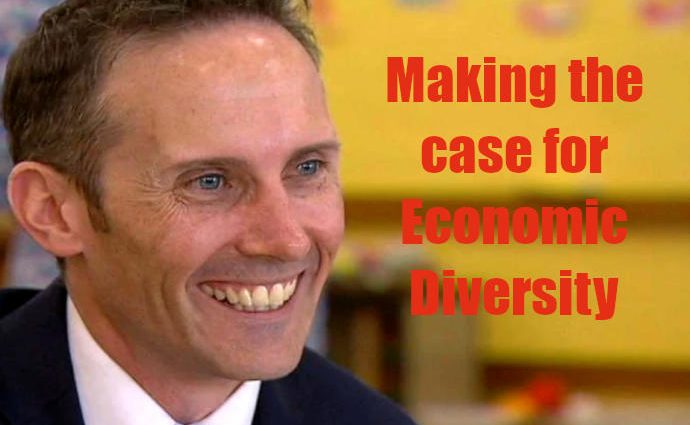According to Dr Andrew Leigh, Labor member for Fenner, Australia has a strong case for economic complexity.
Imagine a stock-trading Rip Van Winkle who went to sleep on Wall Street in the mid-1980s and just woke up today. When he looked at the biggest firms on the US market, he would be startled. In the mid-1980s, the largest US firms were IBM, Mobil, Exxon, Ford and General Motors. Today, they are Apple, Microsoft, Amazon, Alphabet and Facebook.
But if he’d gone to sleep on Bridge Street, Sydney, our stock trader might have wondered if he’d slept at all. In the mid-1980s, the largest Australian firms were Westpac, the Commonwealth Bank, NAB, ANZ and BHP. Today, they are Westpac, the Commonwealth Bank, NAB, BHP and CSL.
This isn’t just about firms, it’s about industries. A generation ago, the largest US firms included two oil companies and two car companies. Today, technology rules the roost. Yet in Australia, the same banks and the same mining company persist, with biotechnology firm CSL the only new entrant into the top five. Over the last generation, the biggest US businesses have been dethroned, and replaced by new firms from an entirely new sector. In Australia, it’s business as usual.
It gets worse. One remarkable analysis goes all the way back to 1917, at the end of World War I. Among America’s top ten companies then, none are top ten today. But among Australia’s top ten companies in 1917, five are still top ten today. In some form or another, Westpac, ANZ, NAB, BHP and Wesfarmers have enjoyed more than a century at the top of the Australian sharemarket.
The average Australian company is considerably older than in other countries. Weighted by market capitalisation, the average listed company in Australia today is 105 years old, compared 95 in Britain, 82 in the United States, and 77 in Japan. Our sharemarket is dominated by large resources firms and big banks. Less than two and a half centuries after European settlement, there is something peculiar about the fact that Australia’s typical listed firm is more than a century old. Australians can be proud of our venerable companies, but the situation is akin to Little Athletics collapsing while the Masters Games booms. It doesn’t bode well for the future.
A similarly troubling picture comes from the Atlas of Economic Complexity. Developed by a team at Harvard’s Center for International Development, the atlas begins with the idea that some products are more complex than others. To make medical imaging devices or jet engines takes plenty of knowledge and extensive networks of people. To make wood logs or coffee beans requires less knowledge and smaller networks.
Also read: No One Left behind in Labor’s blueprint for future
Lead author Ricardo Hausmann and his team liken the problem to Scrabble. A player with just a few letters can only make a few words. Having a broader mix of letters opens the possibility of making more words. Countries that are more complex are like scrabble players who can make more words.
As a proxy for the complexity of an economy, the experts use the products that a nation exports. Products like medical imaging devices are considered complex since few other countries export them, and those who do tend to export a wide range of other products. By contrast, products like diamonds are not considered especially complex, since diamond exporting countries tend to just export diamonds.
From the diversity of a country’s products, it is then possible to work back and calculate a proxy for the diversity of its economy. According to the latest rankings, the world’s most complex economies are Japan, Switzerland and Germany, while the least complex are Liberia, Guinea and Nigeria.
As you might expect, economic complexity correlates pretty highly with a country’s income level – in fact, it explains about four-fifths of the variation across nations. But complexity also turns out to be a good predictor of future economic growth, even given a country’s level of development. Take two countries with similar levels of income, and the growth prospects of the more complex country are better than those for the less complex nation.
How does Australia fare on the Economic Complexity Index? In a word, badly. Out of 133 economies that the experts have assessed, we come 86th, below halfway. The three countries ahead of us were Albania, Oman and Paraguay. When it comes to living standards, Olympic prowess or international heft, Australians think of ourselves as being in the league of Germany. But an objective analysis of the complexity of our economy suggests that it looks more like Albania. It isn’t just that we export relatively few products; it’s that the kinds of things we export tend to be exported by pretty undiversified countries.
An easy response would be to say that Australia’s lack of complexity is a response to the mining boom. But it turns out that even in 2000, before the mining boom, Australia’s exports weren’t particularly complex. Over the longer run, Hausmann and his colleagues estimate that Australia’s economic complexity ranking stayed pretty constant from the mid-1960s to the late-1970s, then fell markedly over the past generation. On their measures, we have never been an especially complex economy. But we’ve gotten a lot ‘simpler’ in recent years.
Creating a more dynamic and complex economy isn’t an easy task. But if we get it right, it’ll ensure more jobs and better wages for Australians. Like a person with a variety of skills, an economy with a diversity of strengths is more adaptable when shocks come, and more likely to prosper in an uncertain world.
This opinion piece by Dr Andrew Leigh was first published by The Australian on Monday, 24 January 2022.

